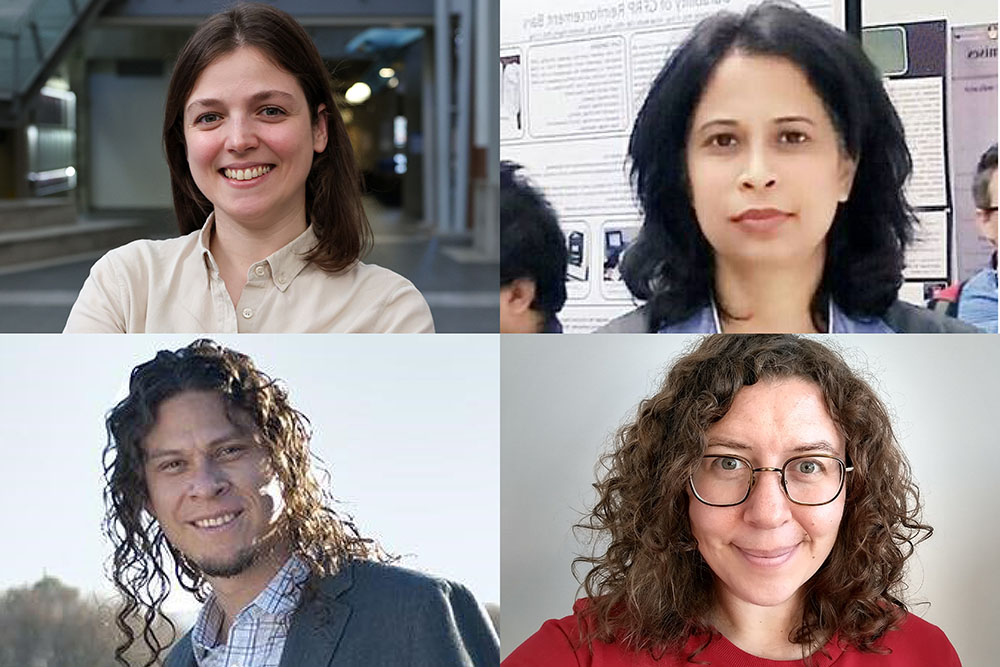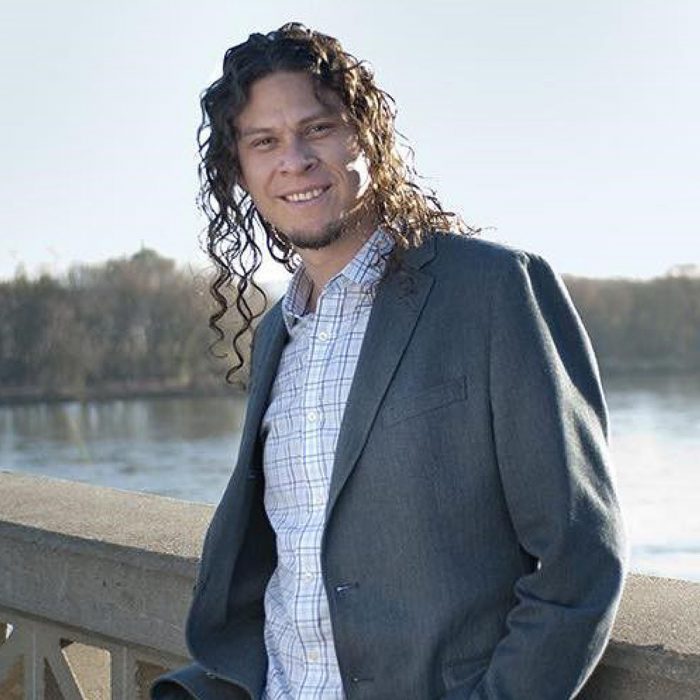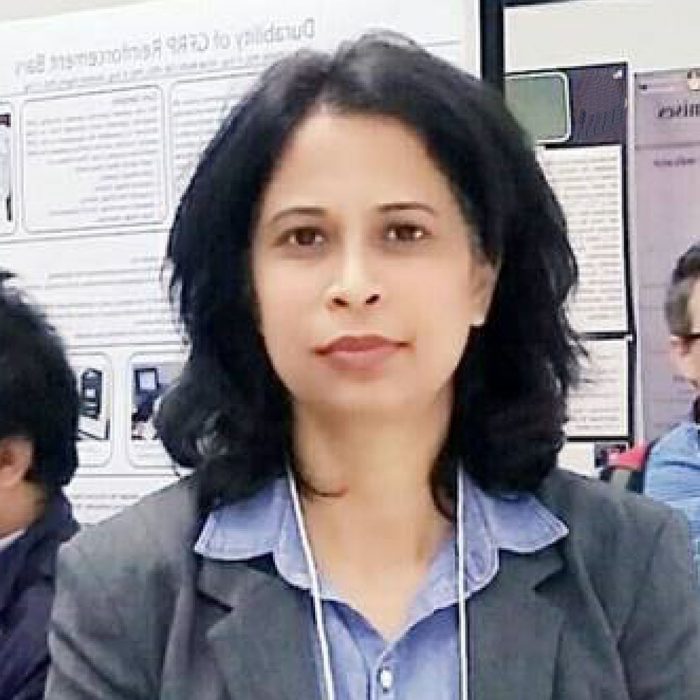
Price Faculty of Engineering welcomes new faculty members
With a wealth of different experiences and backgrounds, we are delighted to welcome to the Price Faculty of Engineering four new academic faculty members and instructors. Driven by their desire for student success, each have already begun making a lasting impact on our students. We asked each of them a few questions to help us to get them to know them a little better. Here’s what they had to say:

Gursans Guven Isin, Assistant Professor
Department of Civil Engineering
What is your teaching philosophy for preparing our students not only for their current studies but for their future careers?
I aim to show my students the real value of the topic they are learning by helping them connect it to their existing knowledge, and showing how it can be used in practice and how relevant it is to their future professional careers. At the undergraduate level, in addition to transferring knowledge, I aim to spark the desire for the engineering profession in students. At the graduate level, I become the person who shows the students the way to conduct research and develop the necessary skills that are needed to become a researcher and that they can use in their professional careers.
What would you consider your proudest professional accomplishment?
I’m proud of myself for not being afraid of taking risks and trying to do better and learn more in my career. My proudest professional accomplishment would be when I decided to leave my previous job as a professor and move to Canada with my family to build up a whole new academic career where I first started as a postdoctoral researcher and then moved to my current position as an assistant professor. And I’m thankful that it has been a wonderful learning experience and that my family has been very supportive of me throughout my whole career.
What attracted you to UM?
The University of Manitoba attracted me due to being a research-intensive university that is well established and has a long history. I like that new faculty are supported through internal funding programs and there are also programs to support the development of new inter-multidisciplinary research collaborations between researchers from different disciplines. I also like that the university offers a great number of programs of study and has a large student body both at undergraduate and graduate levels from around the world.
Anything else you’d like to share with our readers?
Starting early in their academic career. I’d recommend them to be on the lookout for opportunities for training and development, such as internships or workshops, to get practical experience as much as possible and build up a strong skill set. I’d also advise them to stay up-to-date, follow the technology and industry trends, be aware of current challenges and opportunities for change.

Ricardo Mantilla, Associate Professor
Department of Civil Engineering
What is your teaching philosophy for preparing our students not only for their current studies but for their future careers?
Over the years I have organized my classes around the concept of opportunity. I learned early in my teaching career that students have different rhythms and strategies for learning new material, but the evaluation of their level of knowledge is typically done through very standardized procedures. I have adapted my classes so that everybody has the opportunity to show that they learned the material by creating extra-credit activities that are engaging and connected to real-life problems that allow students to connect their knowledge to engineering applications.
What would you consider your proudest professional accomplishment?
Two events determined the direction that my research has taken in the last 10 years. First were the epic floods of 2008 in Eastern Iowa, which opened my eyes to the relevance of the theoretical advances in flood processes that I had developed for many years. The second was the establishment of the Iowa Flood Center (IFC) in 2009 which created a home for turning research results into better information and predictions for stakeholders in the State of Iowa. As part of the IFC, I developed and implemented a regional flood forecasting system based on the Hillslope Link Model (HLM) that I developed during my MSc and PhD programs.
What attracted you to UM?
Manitoba is a province dominated by water issues. From the fact that 97% of its electricity is generated by Hydropower to being the foundation of its agricultural productivity. At the same time, historic floods in the region and the recent historical drought make water excess and lack it some of the most critical issues for the long-term sustainability of the province’s prosperity. I foresee the University of Manitoba growing into a powerhouse of water-related research in this age of rapid Climatic and Anthropogenic Change that puts equity and human rights at the center of our understanding of a sustainable future.
Anything else you’d like to share with our readers?
Technology is evolving very rapidly and our access to information has grown faster than our ability to digest it and synthesize it. I firmly believe that engineering students must become proficient in the use of computational tools that allow them to process, manipulate, and visualize the massive amounts of data that are being collected around the world that include environmental variables, and data on social, and economic activities. The field of engineering is very broad, and every student will find a home for their talents and passions, but regardless of the area chosen, students need to recognize that Engineers transform the world for better or worse, therefore they need to develop the ability to think of the short-term and long-term consequences of their actions and to learn the tools to help them do so. In short, follow your passion and learn how to code.

Huma Khalid, Instructor
Department of Civil Engineering
What is your teaching philosophy for preparing our students not only for their current studies but for their future careers?
I believe teaching is an endless journey, where a good teacher is always looking for new ideas and methodologies. The main gap I identify in my field of civil engineering is to prepare students for real work-life situations. To fill this gap, one should lecture using the latest research findings and should engage students in discussion. The syllabus should be designed in such a way that after finishing the course, students are not only equipped with fundamental scientific principles and understanding of engineering methods but also can apply their expertise and these methods to solve real-life problems.
What would you consider your proudest professional accomplishment?
Though there are many accomplishments that I am very proud of during my professional career like completing my PhD degree and becoming registered as a professional engineer in Canada, the one I’m most proud of is when I got a PhD scholarship after getting the second position in national scholarship exam competing with thousands of students.
What attracted you to UM?
Teaching is always my first choice. I have been teaching at different universities right after getting my first degree in civil engineering. Hence, after moving to Winnipeg, I continue this passion at UM.
Anything else you’d like to share with our readers?
Learning does not stop after graduation. In fact, the real learning begins after. I would advise them to learn professional skills, earn a reputation for hard work, and never be afraid of hands-on work.

Kari Zacharias, Assistant Professor
Centre for Engineering Professional Practice and Engineering Education
What is your teaching philosophy for preparing our students not only for their current studies but for their future careers?
My teaching focuses on building engineering students’ capacities for critical reflection. Whether I am teaching a course in communication, technology and society, or engineering design, I encourage students to think about the choices and complexities behind the technologies or practices that we think of as a standard. I believe that it is vital for engineers to understand their work as sociotechnical, both during their studies and as they pursue their post-university careers.
What would you consider your proudest professional accomplishment?
For me, as for many of us in the academy, my proudest moments are the ones when I can tell that my work has made an impact. Much of my research is ethnographic, which means that I spend a lot of time with the people in the spaces that I’m studying, trying to understand them and what they do. Hearing from those people that my research has helped them think about their work in new ways has been very meaningful.
What attracted you to UM?
I’m so excited to have joined my colleagues in the Centre for Engineering Professional Practice and Engineering Education. There are very few places in Canada that focus on engineering education as a research area. My background is in both engineering and the social sciences, so the Centre and the Price Faculty of Engineering offer a unique opportunity to connect these different aspects of my training, and to bridge my research, teaching, and service work. I’m new to Winnipeg as well, so I’m also enjoying the opportunity to get to know a new city and province
Anything else you’d like to share with our readers?
Learn from people whose expertise and experiences are different from yours. Keep an open mind about where your degree and your career might take you. Make choices with your values and the well-being of your community in mind.






